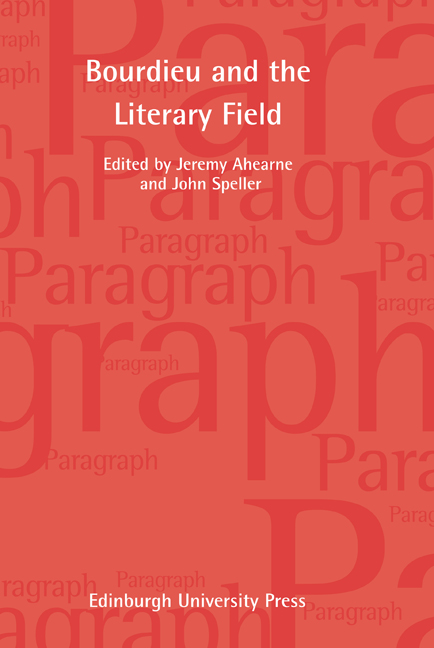Book contents
- Frontmatter
- Contents
- Introduction: Bourdieu and the Literary Field
- How Field Theory Can Contribute to Knowledge of World Literary Space
- Autonomy Revisited: The Question of Mediations and its Methodological Implications
- The Literary Field and the Field of Power: The Case of Modern China
- Between Repression and Anamnesis: Pierre Bourdieu and the Vicissitudes of Literary Form
- Reading and Reflexivity: Bourdieu’s Faulkner
- Fields and Fragments: Bourdieu, Pascal and the Teachings of Literature
- On an Enigmatic Text by Pierre Bourdieu
- Apollinaire, Autumn Ill
- Notes on Contributors
Apollinaire, Autumn Ill
Published online by Cambridge University Press: 17 September 2020
- Frontmatter
- Contents
- Introduction: Bourdieu and the Literary Field
- How Field Theory Can Contribute to Knowledge of World Literary Space
- Autonomy Revisited: The Question of Mediations and its Methodological Implications
- The Literary Field and the Field of Power: The Case of Modern China
- Between Repression and Anamnesis: Pierre Bourdieu and the Vicissitudes of Literary Form
- Reading and Reflexivity: Bourdieu’s Faulkner
- Fields and Fragments: Bourdieu, Pascal and the Teachings of Literature
- On an Enigmatic Text by Pierre Bourdieu
- Apollinaire, Autumn Ill
- Notes on Contributors
Summary
AUTUMN ILL
Autumn ill and adored
You will die when the storm blows in the rose gardens
When snow will have fallen
In the orchards
Poor autumn
Die in whiteness and riches
Of snow and ripe fruit
While far up in the sky
Sparrowhawks glide
Over the foolish, dwarfish, greenhaired nymphs
Who have never loved
On the distant tree line
The stags have belled
And how I love—oh season—your murmurings
The fruit falling with no one to gather it
The wind and the forest weep
All their tears in autumn leaf by leaf
The leaves
We trample
The train
Rolls by
Life
Flows away
‘Autumn ill and adored’, autumn adored because of its illness, because of its mortality. Is not Apollinaire, the poet of the flux of time, of the death of love, also the poet of the love of death, of the love of time passing, of the love of love as the terrain par excellence of this frailty?
The poet addresses autumn to announce its destiny, its final hour. He is the vates, the soothsayer, who says to autumn that it has had its moment, that its time has come or at least will come soon. There follows a series of antitheses: the wind and roses, the snow and the orchard, winter and spring, death and youth. From the future (you will die) Apollinaire shifts into the future anterior(when snow will have fallen), the future accomplished, that is the future already past, the tense of prophecy, which speaks of the future as if it had already happened.
The spring, the roses, the rose garden. Spring is the season of innocence, of hope and fragility. Autumn is the season of transition and decline, when the midday sun begins to set; the frailest of seasons, the most temporal of times. The wind is the west wind dear to Debussy, the wind that brings death to the rose gardens, a violent wind (underlined by the alliteration of ‘r’). Petals that blow away, roses that lose their flowers, the poem is like a dramatized version of Ronsard's elegy. This image of violence is redoubled: the snow, a mortal whiteness, a cruel coldness, which burns and destroys silently, without a sound as it falls, comes to complete the brutal and sudden onslaught of the wind.
- Type
- Chapter
- Information
- Bourdieu and the Literary FieldParagraph Volume 35, Number 1, pp. 131 - 136Publisher: Edinburgh University PressPrint publication year: 2020



